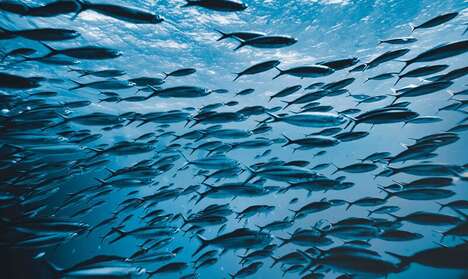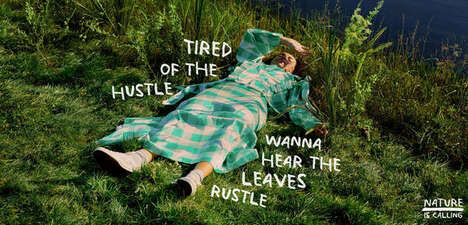Protecting Our Oceans
An Interview with Program Director at MSC Canada Kurtis Hayne
 Kurtis Hayne, Program Director of MSC Canada, dives deep into the future of ocean conservation, unveiling inspiring everyday actions to protect our seas and sharing compelling insights from the 2024 MSC GlobeScan Survey. Leading MSC Canada's growth strategy, Kurtis collaborates with fisheries, seafood companies, and various stakeholders to champion sustainability. According to the latest survey, 93% of Canadians are deeply concerned about ocean health, with pollution, overfishing, and climate change topping their list of worries. Amid growing skepticism, Kurtis reveals how both individual actions and collective efforts can create a powerful wave of change, ensuring our oceans remain vibrant and thriving for future generations.
Kurtis Hayne, Program Director of MSC Canada, dives deep into the future of ocean conservation, unveiling inspiring everyday actions to protect our seas and sharing compelling insights from the 2024 MSC GlobeScan Survey. Leading MSC Canada's growth strategy, Kurtis collaborates with fisheries, seafood companies, and various stakeholders to champion sustainability. According to the latest survey, 93% of Canadians are deeply concerned about ocean health, with pollution, overfishing, and climate change topping their list of worries. Amid growing skepticism, Kurtis reveals how both individual actions and collective efforts can create a powerful wave of change, ensuring our oceans remain vibrant and thriving for future generations.Tell us your name and a little bit about your role at the Marine Stewardship Council (MSC) and what drives your passion for ocean conservation.
My role is to lead the growth strategy for the MSC in Canada. This means engaging and retaining both fisheries and seafood companies in our program to move the industry toward a more sustainable basis; increasing consumer awareness and understanding to help guide their seafood choices; and working with all manner of stakeholders including NGOs, academia and governments. I work with my team to support Canadian partners on their journey toward sustainability, helping ensure the long-term health of fisheries and oceans while providing sustainable seafood to increasingly discerning Canadian consumers.
The ocean and its vast importance to all people inspires my work. If we take care of the ocean, it takes care of us. Yet globally, our ocean, rivers, and lakes remain under immense pressure. With the global population set to reach 9.7 billion by 2050, we face an unprecedented challenge: how to feed and sustain a growing population while ensuring we do not undermine our planet in the process. My work focuses on people, our planet, and food, aiming to find solutions to some of the largest challenges we face. We all have a vested interest in ensuring we fish and eat sustainably. By aligning incentives to do so, I can help protect our oceans and do my part to safeguard our planet.
1. What does innovation mean to you in the context of ocean conservation?
In our sector, innovation largely means first acquiring the scientific knowledge needed to improve how we harvest our ocean in ways that respect and protect the marine ecosystem. It means producing seafood that’s crucial to food security while ensuring the ocean remains healthy, productive, and able to perform the life-supporting ecosystem services our planet depends on.
The MSC is a standard setter. A global non-profit that operates the world’s leading certification for sustainable fishing. Our Fisheries standard reflects global best practice for environmentally sustainable fishing, and by striving to meet that standard, fisheries in our program are incentivized to find new ways to protect both fish stocks and our ocean. It is often these fisheries that are pushing forward, innovating and redefining what best practice looks like.
Recent years have brought about some of the most transformative innovations in fisheries management and sustainability that I have ever seen. Much of this is due to the rapid advancement of modern technology and its adoption by fisheries. These innovations range from simple and ingenious improvements like LED lights on nets to reduce bycatch, to complex and cutting-edge examples like the use of cameras and sometimes AI to quantify and measure all catch in a fishery so it can be managed more effectively.
As these innovations take hold, are scientifically proven effective, and shared among fisheries, best practice for sustainable fishing also evolves. The MSC then reviews and updates our Fisheries Standard to ensure it reflects the most current definition of global best practice.
2. How does your team generate new ideas to tackle the challenges facing our oceans?
The MSC is truly a multi-stakeholder organization. Our progress and successes can only be achieved by working in close collaboration with fisheries, industry, the scientific community, NGOs and governments, keeping abreast of the challenges they face while learning from and contributing to the solutions they propose. In this sense, one of our greatest strengths and sources of inspiration comes from our role of convener.
Sitting at the cross-section of conservation and responsible consumption is an exciting challenge. Our environmental, policy, and consumer landscapes are dynamic and ever-changing. Thus, we must continuously evolve and broaden our program’s impact to match, which can only be achieved if we also maintain our reach and relevance.
Perhaps one of the most poignant examples today is the urgent need to better understand the impact of climate change on our ocean and fisheries. In this vein, the MSC is carrying out a study that will evaluate vulnerability to climate change in fisheries so they can better understand where issues are likely to arise and the severity of their respective impacts.
The ability for fisheries to adapt to a changing environment is a cornerstone of the MSC Fisheries Standard. We recognize this is increasingly challenging as our climate becomes more variable and extreme. Thus, it is imperative we acquire the science and
knowledge needed to equip fisheries and management bodies with the best tools possible for the task at hand.
3. What are the key findings of the 2024 MSC Globescan Survey, and what do they indicate about Canadians' views on ocean health?
Every other year the MSC commissions the world’s largest survey of seafood consumers that includes over 20,000 respondents globally, and more than 1,500 in Canada.
This year’s results reveal that Canadians are more worried than ever about the state of the ocean (93%, up from 89% in 2022), and that optimism about the future is waning. Only 37% believe that in 20 years we’ll have saved the ocean from irreparable damage, down from almost 50% of Canadian respondents two years ago.
This tells us that Canadians are well informed and aware of the issues facing our ocean, and are rightly concerned. Which is actually a positive for us - it means we can focus more energy and efforts on raising awareness of the solutions at hand than on educating about the problem.
4. Why do you think Canadians are becoming more skeptical about the world's ability to protect our oceans?
We live in an anxious, unpredictable times, which undoubtedly plays on citizens' levels of pessimism. Acute awareness of climate change and its impacts is clearly influencing Canadians' attitudes, but we cannot discount other socioeconomic stressors.
One of the possible factors contributing to pessimism also emerges from our survey data: climate change ranks #1 in overarching environmental concerns among Canadians, and a large majority of them are aware of the link between climate change and ocean protection (82%). Over two-thirds also report that extreme weather events, which have risen in rank among the most concerning environmental threats, have increased their awareness of the importance of ocean protection.
We can thus assume that, as Canadians increasingly see and feel the impacts of climate change first-hand, so too does their eco-anxiety and pessimism about our ability to protect the ocean.
5. How can individuals contribute to ocean conservation in their daily lives?
One important thing to keep in mind is that we don’t all need to be eco warriors to make a difference. In addition to the steps we’re all aware of, like reducing plastic waste, there are three things Canadians can do:
- Don’t give into the pessimism. Keep doing the daily things you know are right for the ocean and planet and know that every small action ladders up to a bigger positive impact.
- Adopt a more climate-friendly diet. Adding sustainable seafood with the MSC bleu fish label to a plant-forward diet is a highly nutritious and lower impact protein choice.
- Reduce unnecessary consumption, of everything (it will save you money too).
6. Can you share an instance where an innovation from another industry significantly influenced your approach to ocean conservation at MSC?
One crucially important facet of sustainability that perhaps isn’t talked about widely enough in our sector is the need for traceability. The ability to verify that a product labeled as sustainable actually comes from a sustainable source does two things: it reduces greenwashing and food fraud (which enhances consumer trust), and rewards, or provides financial incentives, back to the harvesters that are investing in sustainably.
The MSC is currently the only program of its kind that incorporates full supply chain verification through its Chain of Custody certification for businesses. We are taking inspiration from other sectors of the food and food safety industries and exploring how we can incorporate rapidly evolving digital traceability solutions into our program. This would further strengthen our traceability requirements and reinforce the integrity of the MSC ecolabel.
Given the highly complex and global nature of the seafood industry, we anticipate this advancement will greatly increase operational efficiencies while further mitigating risks of illegal fishing, food fraud, and greenwashing.
7. Looking to the future, how will the MSC continue to lead in ocean conservation and address the growing concerns highlighted by the
survey?
Our Globescan survey showed that Canadians trust scientists, NGOs and certification organizations the most to lead on ocean protection. It’s important for us to maintain that trust so consumers continue to look to our label as a way to make sustainable seafood choices that contribute to the health of our ocean.
We’ll continue to broaden and scale the reach, impacts, and assurance of our program to match the ever-changing environmental, policy, and consumer landscapes. Our roadmap for success includes:
1. Continued improvements and advancements to our Standards
2. Growing our Ocean Stewardship Fund aimed at funding marine science and increasing the number of sustainable fisheries worldwide (we'veve already raised US$10 million USD and aspire to raise $100 million by 2032 to further this vision).
3. Evolve the supply chain assurance behind our program by incorporating digital traceability solutions.
4. Broaden our program and outreach to better engage fisheries that need significant improvements to operate sustainably and meet the MSC Standard. This includes small-scale and global south fisheries.
References: msc.org


